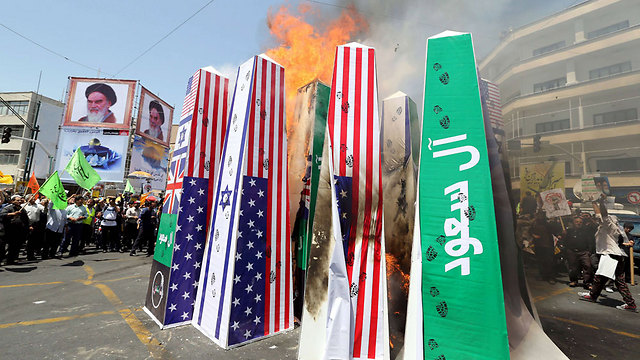Iran’s supreme leader dashes hopes of post-deal relations boost with US
Associated Press/Ynetnews/Published: 07.11.15/ Israel News
As negotiators at Iran nuclear talks labored to make headway, the country’s supreme leader called Saturday for the struggle against the US to continue, in comments suggesting that Tehran’s distrust of Washington will persist no matter what the outcome of the talks. The negotiations entered their 15th day Saturday with no indications of major progress after three extensions and four target dates for a deal, and diplomats said it remained unclear whether an agreement could be reached by Monday, the latest deadline.
Iran and the US have threatened to walk away unless the other side makes concessions. Although it was unclear whether Ayatollah Ali Khamenei was preparing the ground for the failure of the talks, his comments were likely to add to skepticism over the outcome at the negotiating table.
Iran’s state-run Press TV cited Khamenei as calling the US an “excellent example of arrogance.” It said Khamenei told university students in Tehran to be “prepared to continue the struggle against arrogant powers.” Even if Khamenei isn’t signaling that the talks have failed, his comments appear to be a blow to US hopes that an agreement will lead to improved bilateral relations that could translate into increased cooperation in a common cause — the fight against Islamic radicals. Iranian Foreign Minister Mohammad Javad Zarif had hinted at just that last week, suggesting a deal acceptable to his country will open the door to joint efforts on that front.
Zarif and US Secretary of State John Kerry met again Saturday, this time with European Union foreign policy chief Frederica Mogherini present. Of the chief diplomats of the six countries negotiating with Iran, British Foreign Secretary Phillip Hammond and Foreign Ministers Frank-Walter Steinmeier of Germany and Laurent Fabius of France also are already in Vienna. Kerry spoke by telephone to Russian Foreign Minister Sergey Lavrov. The Chinese and Russian foreign ministers have said they will come to Vienna if a deal appears close.
On Friday, Kerry suggested that some progress had been made, telling reporters that the “atmosphere is very constructive,” but stressing that “very difficult issues” remained to be resolved. Since the start of the current round 15 days ago, he has said twice that the negotiations couldn’t be open-ended and warned that the US was prepared to call an end to the talks. Any deal is meant to clamp long-term and verifiable restrictions on Iranian nuclear programs that are technically adaptable to make weapons in exchange for sanctions relief for Tehran. The scope of access to UN inspectors monitoring Iran’s nuclear program remains a sticking point. The Americans want no restrictions. Iranian officials say unrestricted monitoring could be a cover for Western spying. Diplomats say Iran’s negotiators have signaled a willingness to compromise, but hardliners in Iran remain opposed to broad UN inspections.
Another unresolved matter is Iran’s demand for a UN arms embargo to be lifted as part of sanctions relief, a stance supported by Russia and China but opposed by the US and some Europeans. The current round was supposed to conclude on June 30, but was extended until July 7, then July 10 and now July 13. The sides had hoped to seal a deal before the end of Thursday in Washington to avoid delays in implementing their promises.
By missing that target, the US and Iran now have to wait for a 60-day congressional review period during which President Barack Obama can’t waive sanctions on Iran. Had they reached a deal by Thursday, the review would have been only 30 days. Iran is unlikely to begin a substantial rollback of its nuclear program until it gets sanctions relief in return.























